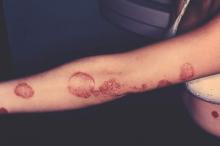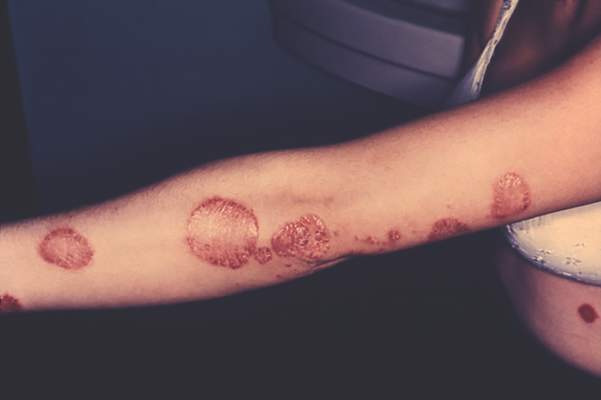User login
Attitudes toward psoriasis and herpes are significantly more stigmatizing than are perceptions of other dermatologic conditions, reported Dr. Jessica M. Donigan and her associates from Massachusetts General Hospital in Boston.
In a survey of 56 adults without any skin conditions aside from typical teenage acne, investigators used an image-based questionnaire to assess attitudes toward psoriasis, compared with other skin conditions such as atopic dermatitis, acne, vitiligo, rosacea, herpes labialis, warts, and tinea versicolor. At least 48% of respondents reported feeling upset by images of psoriasis, although significantly more were upset by images of herpes. Additionally, about 61% believed psoriasis had an infectious cause, with 41% of participants thinking psoriasis lesions looked contagious because of scale, color, and size, the authors reported.
A total of 39% of respondents thought herpes was the most-bothersome skin disease, compared with 30% for psoriasis, although this difference was not significant (P = .42). As many as 86% said they would feel pity if they saw a person with psoriasis, which was significantly greater for any of the other dermatologic conditions except acne, the investigators said.
The findings suggest that “misconceptions of infection and contagion, and feelings of pity cause psoriasis to be as bothersome as herpes labialis,” Dr. Donigan and her colleagues said.
Additionally, despite participants perceiving the two conditions as similarly bothersome, psoriasis may “have a greater overall impact on quality of life because of its continuity and chronicity,” they said. “Because of its potential lifelong impact, it is important to familiarize the public with psoriasis to aid in destigmatization.”
Read the full report in the Journal of the American Academy of Dermatology.
Attitudes toward psoriasis and herpes are significantly more stigmatizing than are perceptions of other dermatologic conditions, reported Dr. Jessica M. Donigan and her associates from Massachusetts General Hospital in Boston.
In a survey of 56 adults without any skin conditions aside from typical teenage acne, investigators used an image-based questionnaire to assess attitudes toward psoriasis, compared with other skin conditions such as atopic dermatitis, acne, vitiligo, rosacea, herpes labialis, warts, and tinea versicolor. At least 48% of respondents reported feeling upset by images of psoriasis, although significantly more were upset by images of herpes. Additionally, about 61% believed psoriasis had an infectious cause, with 41% of participants thinking psoriasis lesions looked contagious because of scale, color, and size, the authors reported.
A total of 39% of respondents thought herpes was the most-bothersome skin disease, compared with 30% for psoriasis, although this difference was not significant (P = .42). As many as 86% said they would feel pity if they saw a person with psoriasis, which was significantly greater for any of the other dermatologic conditions except acne, the investigators said.
The findings suggest that “misconceptions of infection and contagion, and feelings of pity cause psoriasis to be as bothersome as herpes labialis,” Dr. Donigan and her colleagues said.
Additionally, despite participants perceiving the two conditions as similarly bothersome, psoriasis may “have a greater overall impact on quality of life because of its continuity and chronicity,” they said. “Because of its potential lifelong impact, it is important to familiarize the public with psoriasis to aid in destigmatization.”
Read the full report in the Journal of the American Academy of Dermatology.
Attitudes toward psoriasis and herpes are significantly more stigmatizing than are perceptions of other dermatologic conditions, reported Dr. Jessica M. Donigan and her associates from Massachusetts General Hospital in Boston.
In a survey of 56 adults without any skin conditions aside from typical teenage acne, investigators used an image-based questionnaire to assess attitudes toward psoriasis, compared with other skin conditions such as atopic dermatitis, acne, vitiligo, rosacea, herpes labialis, warts, and tinea versicolor. At least 48% of respondents reported feeling upset by images of psoriasis, although significantly more were upset by images of herpes. Additionally, about 61% believed psoriasis had an infectious cause, with 41% of participants thinking psoriasis lesions looked contagious because of scale, color, and size, the authors reported.
A total of 39% of respondents thought herpes was the most-bothersome skin disease, compared with 30% for psoriasis, although this difference was not significant (P = .42). As many as 86% said they would feel pity if they saw a person with psoriasis, which was significantly greater for any of the other dermatologic conditions except acne, the investigators said.
The findings suggest that “misconceptions of infection and contagion, and feelings of pity cause psoriasis to be as bothersome as herpes labialis,” Dr. Donigan and her colleagues said.
Additionally, despite participants perceiving the two conditions as similarly bothersome, psoriasis may “have a greater overall impact on quality of life because of its continuity and chronicity,” they said. “Because of its potential lifelong impact, it is important to familiarize the public with psoriasis to aid in destigmatization.”
Read the full report in the Journal of the American Academy of Dermatology.

